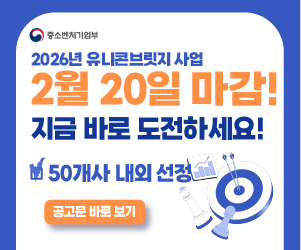안녕하세요. 스타트업 미디어 와우테일 편집팀입니다. 당사는 올해 경기콘텐츠진흥원의 ‘판교경기문화창조허브 입주기업 마케팅 지원 사업’을 운영하며, 경기도내 유망 콘텐츠 기업을 투자자를 비롯한 스타트업 생태계에 소개하고…
[공지] 제9회 바이오헬스 전용 와우데이(10/21)에 투자자를 초대합니다
안녕하세요. 스타트업 미디어 와우테일입니다. 와우테일의 대표적인 IR 데모데이 프로그램인 와우데이(WOW DAY) 9번째 행사를 개최합니다. 최근 정부는 지난 9월 초에 ‘K-바이오 글로벌 5대 강국’…
[공지] 제8회 와우데이(8/27)에 투자자 여러분을 초대합니다(팟캐스트)
안녕하세요. 스타트업 미디어 와우테일입니다. 와우테일의 대표적인 IR 데모데이 프로그램인 와우데이(WOW DAY) 8번째 행사를 아래와 같이 개최합니다. 와우데이는 당사가 인터뷰했던 팀을 오프라인에서 투자자에게 소개하는…
[공지] 와우넥스트 1기 데모데이(6/25)에 초대합니다
안녕하세요. 와우파트너스 투자팀입니다. 와우파트너스는 지난 2월에 액셀러레이팅 프로그램인 와우넥스트(WOW NEXT)를 런칭하고, 공정한 심사를 통해 지난 4월에 첫번째 배치에 참여할 12팀을 선정했습니다. 와우파트너스는 와우넥스트…
[공지] 와우레터와 인터뷰를 팟캐스트로 만나세요
안녕하세요. 와우테일 편집팀입니다. 와우테일은 매일 아침 뉴스레터(한국어), 주 1회 영문 뉴스레터를 발행하고 있고, 정기적으로 영상 인터뷰 프로젝트인 와우투게더를 발행하고 있습니다. 당사 편집팀에서는 뉴스레터와…
[공지] 제6회 와우데이(4/29)에 투자자 여러분을 초대합니다
안녕하세요. 스타트업 미디어 와우테일입니다. 와우테일의 대표적인 IR 데모데이 프로그램인 와우데이(WOW DAY) 6번째 행사를 아래와 같이 개최합니다. 와우데이는 당사가 인터뷰했던 팀을 투자자자에게 소개하는 행사입니다….
[공지] 와우테일이 창업 지원 프로그램의 홍보 파트너가 되겠습니다
안녕하세요. 스타트업 미디어 ‘와우테일’을 운영하고 있는 와우파트너스입니다. 2025년이 시작된지 얼마 지나지 않은 것 같은데, 벌써 3월 중순을 넘어가고 있습니다. 경기가 좋지 않아서 예년에…
[공지] ‘와우투게더’ 인터뷰에 기술창업팀-투자자를 모십니다(~3/31)
스타트업 미디어 와우테일은 지난 2022년부터 2년이 넘는 기간 동안 스타트업 인터뷰 프로젝트인 ‘와우투게더(WOW Together)’를 운영하고 있습니다. 초기에 ‘스타트업투게더’로 출발해서 150팀 이상 인터뷰를 진행했고,…
[공지] 제5회 와우데이(WOW DAY)에 투자자를 모십니다(2/25 오후3시)
안녕하세요. 스타트업 미디어 와우테일입니다. 와우테일은 작년(2024년)부터 당사가 와우투게더 인터뷰했던 팀들이 오프라인에서 투자자를 만나서 교류할 수 있는 데모데이인 와우데이(WOW DAY)를 운영하고 있습니다. 작년에는 WOW…
[공지] WOW NEXT 1기 모집.. “기술 창업팀의 투자자 접근성 높인다”(~2/16)
와우파트너스는 액셀러레이팅 프로그램인 와우넥스트(WOW NEXT) 1기에 참가할 스타트업을 모집합니다. 와우넥스트(WOW NEXT)는 딥테크 기술 기반 스타트업의 또 다른 고객인 투자사, 대중견기업 오픈이노베이션 부서 및…
[공지] 와우파트너스가 투자에 나섭니다
와우파트너스는 지난 2019년 3월 이후에 스타트업 미디어인 와우테일을 운영하고 있습니다. 와우테일을 통해 수 많은 스타트업의 소식을 전하는데 그치지 않고, 인터뷰(와우투게더)를 통해 투자자와 (딥테크)…
[공지] 스타트업뉴스 ‘와우레터’ 1000호를 축하해 주세요
안녕하세요. 와우테일 편집팀입니다. 와우테일의 뉴스레터 서비스인 ‘와우레터(WOW Letter)’가 1,000호 발행을 앞두고 있습니다. 와우레터는 코로나가 대유행하던 2021년에 시작되었습니다. 갑작스런 코로나 대유행으로 인해 강제적인 거리두기를…
[공지] 영문기사 1,000개 돌파
안녕하세요. 와우테일 편집팀입니다. 와우테일은 작년 초부터 영문 기사를 시범적으로 발행했습니다. 한국의 스타트업 생태계는 세계 10위 권에 진입하는 등 눈부시게 발전하고 있지만, 한국의 스타트업…
[공지] 행사(Event) 페이지 베타 오픈… 데모데이를 알려주세요
안녕하세요. 와우테일 편집팀입니다. 지난 공지를 통해 와우테일 사이트가 새롭게 개편되었다는 소식과, 향후 기사 외에 스타트업 생태계에 꼭 필요한 서비스를 순차적으로 오픈한다는 소식을 전해드렸습니다. …
[공지] 와우테일 사이트 개편
안녕하세요. 와우테일 편집팀입니다. 와우테일은 이번 8월에 사이트를 전면적으로 개편했습니다. 지난 2019년 창간 이후에 블로그스럽게 운영해 왔는데, 이번에 뉴스 뿐만 아니라 창업 생태계에 필요한…
[공지] 제4회 WOW IR Day(8/13)에 여러분을 초대합니다
안녕하세요. 스타트업 미디어 와우테일 편집팀입니다. 와우테일은 투자자 대상 인터뷰 프로젝트인 ‘스타트업투게더‘를 운영하고 있습니다. 지난 2년 간 107팀이 넘는 창업팀이 출연해서 인터뷰를 진행했고, 투자혹한기라는…
[공지] 제3회 WOW IR Day 개최(6/27)
안녕하세요. 스타트업 미디어 와우테일 편집팀입니다. 와우테일은 투자자 대상 인터뷰 프로젝트인 ‘스타트업투게더‘를 운영하고 있습니다. 지난 2년 간 107팀이 넘는 창업팀이 출연해서 인터뷰를 진행했고, 투자혹한기라는…
[공지] 제2회 WOW IR Day 개최(5/23)
안녕하세요. 스타트업 미디어 와우테일 편집팀입니다. 와우테일은 투자자 대상 인터뷰 프로젝트인 ‘스타트업투게더‘를 운영하고 있습니다. 지난 2년 간 100팀이 넘는 창업팀이 출연해서 인터뷰를 진행했고, 투자혹한기라는…
[공지] 제1회 ‘스타트업 투게더 IR’ 개최(4/19)
안녕하세요. 스타트업 미디어 와우테일 편집팀입니다. 와우테일은 투자자 대상 인터뷰 프로젝트인 ‘스타트업투게더‘를 운영하고 있습니다. 지난 2년 간 100팀이 넘는 창업팀이 출연해서 인터뷰를 진행했고, 투자혹한기라는…
[공지] 투자 혹한기, 스타트업 투자유치 고군분투기(12/13 오후 4시 라이브)
스타트업 생태계에 투자 혹한기가 도래했다. 어려운 상황에서 투자를 받는 곳도 있지만, 대부분의 스타트업이 투자유치에 어려움을 겪고 있다. 올해 3분기까지 스타트업 투자는 5.4조원의 역대…











답글 남기기
댓글을 달기 위해서는 로그인해야합니다.